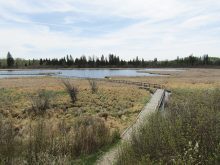Those who live in rural communities in Manitoba know how important it is to keep programming and services such as health care and education local.
Bit by bit, core programming has been centralized and decisions made further away from those who depend on these vital services. But this is not so for education. And people who live in Manitoba’s heartland know how important it is to ensure that community ownership of the local school remains untouched.
In every community across Manitoba today, the local public school serves as the engine that drives the skills and knowledge that will serve the needs and requirements of another generation. But gone are the days of the one-room schoolhouse that once dotted the open prairies of Manitoba.
Read Also

VIDEO: Assiniboine College program sows digital farm skills
The new digital agriculture fundamentals program has kicked off at Assiniboine College in Brandon.
Today’s students have the ability to build their foundations on far more than “reading, writing and arithmetic.” These subjects remain just as important, but so too are the advanced vocational programs in the skilled trades. Band concerts and theatre productions remain testament to the importance of music, art and drama programs. And state-of-the-art science labs ensure our kids are readied for tomorrow. These are options designed to sustain the rural and northern way of life, while bringing the world to their very doorstep.
There are many critics who believe that delivering such options can be made more economically sustainable by removing the local taxation authority of the local school board. Why not go the way of our neighbours to the east and the west and strip trustees of their ability to tax?
But as those in Saskatchewan will tell you, the move by Regina to centralize school property tax meant that the total amount of property tax collected before and after remained largely the same. And just ask the municipalities in Ontario what happened when Toronto capped their school property taxes 20 years ago. The Government of Ontario heaped responsibilities for health care and welfare on municipalities and town councils, while subsequently redirecting billions in tax dollars from elsewhere to sustain that province’s public schools.
There are still other critics who invite their fellow citizens to consider amalgamation as another option for greater efficiency. Why not create larger school divisions and, in the process, take away the local community’s right to own their public school? In this respect, we would all do well to remember what happened the last time school divisions were amalgamated in Manitoba: a decision that resulted in the elimination of 20 school boards nearly 20 years ago.
In 2005, after all the dust had settled, amalgamation achieved virtually no savings. Instead of saving the millions targeted by government of the day, dollars were spent to save dimes. The final conclusion of an independent study on the experience was that, rather than amalgamating school divisions, the government would have done better to focus time and effort on meaningful education reform.
School trustees are your neighbours and they are elected by you and your neighbours. As local residents, they understand the growing complexities involved with the current education funding model. School boards appreciate that for many Manitobans, it is time to address the question of education funding. So it was with this in mind that our association chose to gather a group of independent experts just last year to look at how local education funding could be meaningfully reformed.
Coming from every walk of life, including agriculture, commerce, municipal and education backgrounds, the experts on that council studied many options and solutions for meaningful change. In the end, we found that this province and its people would benefit from the establishment of a formal and independent tax commission. A full study that would look at the big picture when it comes to all taxes in Manitoba – local, provincial and federal – and propose a clear path forward. In the end, we collectively agreed that when it comes to taxes, no Manitoban is served by trading the harvest for a bushel.
Still, there are those who believe that all school boards should have their taxing responsibilities taken away and that local school divisions ought to be amalgamated. But in real terms and at the end of the day, this means that communities across Manitoba would then be forced to go hat in hand down to Broadway for funding each and every year, even as decisions made for the local community would in fact be made outside that community.
Do local voice and local choice still matter when it comes to our schools? This is best left to each local community to decide. Before you do, please consider that through your vital democratic right to elect your own school board, your community gets to decide what level of funding is sustainable when meeting the needs of their schools and students. It doesn’t matter if you have children in school or not because, at the end of the day, education belongs to communities because everyone in the community benefits from the education that is provided.
Since 1872, when local trustees were first chosen by their community to set school budgets and provide for the education of local students in each of the four years for which they are elected, Manitobans have had the opportunity to decide who represents their interests and at what cost to the community. To this day, this has remained every community’s vital democratic right.
With the provincial review commission on kindergarten to Grade 12 education in Manitoba announced recently, there is no better time to ensure that local voice and local choices continue to be heard when it comes to public education in your community.
Silence on your part will certainly mean that the critics’ voices will only become louder. This spring, as the fields are prepared and the review commission’s public consultations begin across Manitoba, we therefore invite all citizens to join us in supporting the continued role of your local school boards – local voices making local choices for your community.
Education is a crop with guaranteed yield in years to come, but only if we together plant the right seed.
For more information please visit ‘Local Voices’ on the Manitoba School Boards Association website.
Alan M. Campbell is president of the Manitoba School Boards Association.


















